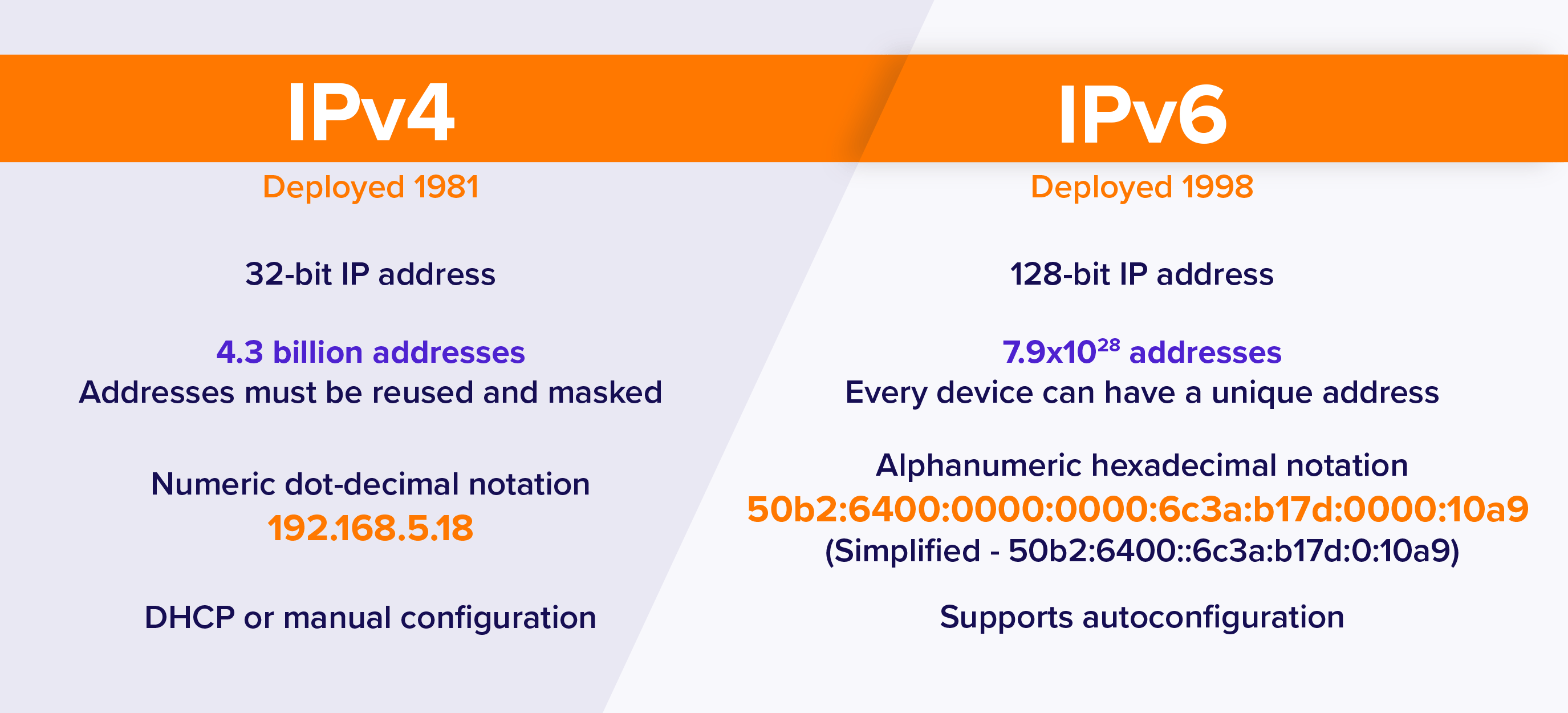The Internet Protocol (IP) is a vital part of online communication between users, devices, and businesses because of the current digital-first market. There are two significant versions of IP addresses, which are common in communication and data transfer on the web; they are IPv4 and IPv6. Their differences are not only a technical need to understand, but it can also be an art of marketing, too. Marketers use the IP-based data to target the ads, personalize, analyze, and segment the users. This blog addresses the significant difference in IPv4 and IPv6 and how they affect marketing practices in the digital world.
Understanding the Key Difference in IPv4 and IPv6
1. Address Length and Format
IPv4 has an address format of 32 bits, which is depicted in 4 decimal numbers that are separated by dots (e.g., 192.168.1.1). Instead, IPv6 uses a 128-bit hexadecimal address space. It is split by colons, permitting a nearly infinite number of distinct network addresses.
2. Address Availability and Exhaustion
IPv4 has a capacity of about 4.3 billion unique addresses that are almost being exhausted because of the world’s internet expansion. IPv6 addresses this shortcoming since it has 340 undecillion addresses. This can scale as well as guarantee an ever-growing internet to support future technologies and interconnected smart devices.
3. Header Complexity and Efficiency
IPv4 headers are more complex and have variable sizes. Hence, they take more time to process. IPv6 provides a simpler, fixed-sized header with only crucial fields. This makes it more efficient and faster in routing processes.
4. Security Features and IPsec Integration
The IPv4 operating system has IPsec security as an optional, which means that encryption and authentication must be set manually. IPv6 has built-in IPsec. Thus, it guarantees the safety of transmission of data, authentication, and protection of integrity across networks by default.
5. Configuration and Address Assignment
IPv4 typically must be configured manually or through DHCP to allocate addresses. IPv6 makes this process easier under Stateless Address Autoconfiguration (SLAAC). Meanwhile, devices will automatically create and assign their own unique addresses. They will automatically connect to networks without the need for manual configuration or external configuration servers.
6. Support for Mobility and Multicasting
When you buy static IPv4 address, it is mostly based on broadcasting to distribute the data, and this may result in unnecessary loads on the network. IPv6 is used to substitute broadcasting with multicasting, which is more efficient when it comes to bandwidth. It is also favourable in terms of enhanced mobility capabilities, where one can hand over to a different network without compromising on the strength of the connection.
Emerging Role of IP Addresses in Marketing
When you are buying IPv4 block, remember that IP addresses are not just technical identifiers, but excellent tools in the hands of marketers. They allow tracing geolocation as well as segmentation of the audience, as well as contextual delivery of content. Analysing IP data, marketers can know the user demographics, the type of device, and the behaviour online.
As an example, IP targeting assists in showing area-specific advertisements, gauging activity, and estimating the effectiveness of the campaign. There is still the use of IPv4 data in marketing analytics. IPv6 data has improved the accuracy and coverage of data in a variety of devices.
With the increase in IPv6 usage, marketers will have more datasets available to them. They can enhance the relevance of ads and minimize wasted impressions.
Importance of IPv4 vs IPv6 in Digital Advertising
Digital advertisements depend to purchase IPv4 addresses for targeting and attribution. Current ad delivery is predominantly based on IPv4 networks, which provide a well-established infrastructure in campaign management.
Nevertheless, with the adoption of IPv6, marketers have new opportunities of being able to target audiences and attribute them accurately. The latest protocols of IPv6 are faster and more trackable, which is needed in programmatic advertising and AI-driven personalization.
Early adoption of IPv6 provides brands with a competitive advantage in terms of advertising performance, conversion, and measurement of ROI. By contrast, companies that have only been using IPv4 stand the risk of information gaps when more consumers switch to IPv6-only systems.
Common Transition Challenges for Marketers
There are challenges to the migration of IPv4 to IPv6 despite its benefits. Numerous marketing systems, databases, and analytics software continue to operate using IPv4 infrastructure. Compatibility problems, complexity of configuration and data integration challenges might accompany the transition.
Businesses need to make sure that the two protocols can co-exist (dual-stack operation). This will affect the performance of the campaign and reach the audience. The disruptions will be minimized by investing in IPv6-ready platforms, CDN upgrades, and trained IT support.
In the long run, early adapting marketers will future-proof their digital strategies and have a higher degree of flexibility regarding the targeting of audiences and the accuracy of attribution.
FAQs: Common Questions People Often Ask
1. Why is IPv6 replacing IPv4?
IPv6 will substitute IPv4 in that it provides significantly more IP addresses, increased security as well as efficiency in the current level of the internet connection.
2. Can IPv4 and IPv6 work together?
Yes, they are compatible and can deploy dual-stack setups, where they can both coexist and communicate smoothly with one another.
3. What is the impact of IPv6 on digital marketing?
IPv6 improves the accuracy of analytics and the efficiency of the delivery of the ads. It facilitates the identification of unique devices and speeds up network performance.
4. Does marketing still require IPv4?
Yes, IPv4 is essential because most marketing platforms, tools, and databases are still based on IPv4 infrastructure all over the world.
Unlock Limitless Marketing Potential with IPV4 TradeHub
Empower your digital campaigns with premium IPv4 resources from IPV4 TradeHub! We specialize in buying, selling, and leasing IPv4 addresses, ensuring your business maintains seamless connectivity and marketing precision. With expert support, transparent pricing, and quick transfers, IPV4 TradeHub helps you stay ahead in an evolving IPv6 world. Don’t let address scarcity limit your marketing growth.
